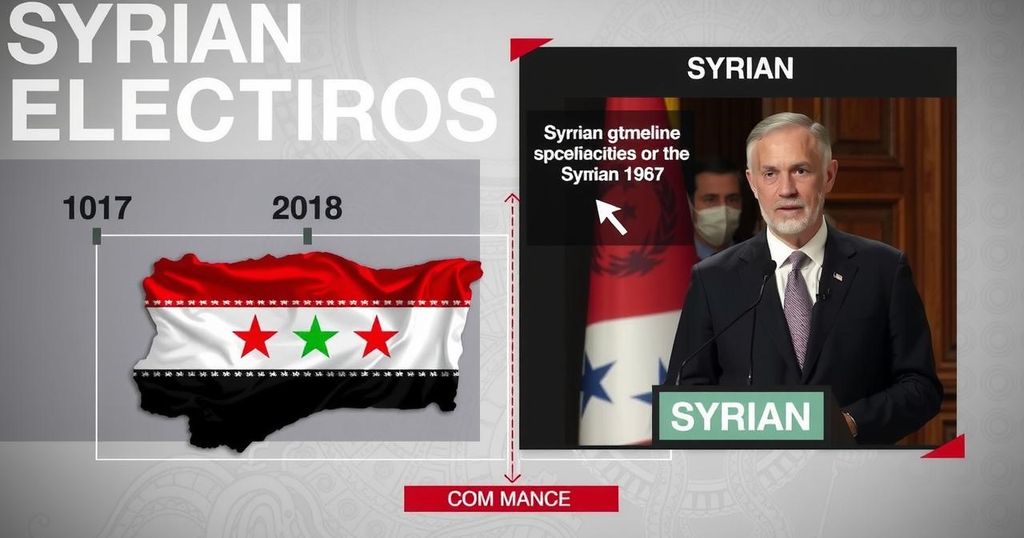Syria’s de facto leader, Ahmad al-Sharaa, announced that elections could be delayed for up to four years, underscoring the necessity to establish foundational infrastructure and draft a new constitution. Following the overthrow of the Assad regime, Al-Sharaa confirmed the eventual dissolution of his group, Hayat Tahrir Al-Sham, and emphasized rebuilding the nation while seeking international legitimacy through diplomatic engagements with various nations.
Elections in Syria may take up to four years to organize, as stated by Ahmad al-Sharaa, the de facto leader following the recent overthrow of the Assad regime. This marks his initial comments regarding an electoral timeline since the regime’s collapse. Al-Sharaa emphasized the necessity of establishing the appropriate infrastructure to facilitate elections, indicating that the interim government intends to draft a new constitution, a process that could extend up to three years. He remarked, “We are now in the re-foundation of the country and not just managing the country… there is a lot of destruction in the country because of a regime that ruled for more than 50 years.” Furthermore, he articulated the goal of preventing a recurrence of past governance failures to ensure progress over the coming years. Al-Sharaa also announced that his group, Hayat Tahrir Al-Sham (HTS), would eventually be dissolved, an event anticipated during the forthcoming National Dialogue Conference, with no date established yet for this crucial meeting.
In a context of shifting political dynamics, Al-Sharaa expressed a desire for Russia to maintain a relationship with Syria that aligns with its historical ties. As Russia reportedly scales back its military presence following Assad’s ousting, Al-Sharaa aims to secure international acceptance and reposition himself away from his extremist roots, as demonstrated during recent diplomatic engagements. Notably, a Ukrainian delegation led by Foreign Minister Andrii Sybiha recently met with him, highlighting a burgeoning international dialogue and shared experiences between Syria and Ukraine. Al-Sharaa’s diplomatic approach reflects a shift from his previous jihadist persona as he now dons formal attire suitable for international representation.
Moreover, Al-Sharaa’s discussions with various European diplomats and a recent high-level U.S. delegation led by Barbara Leaf suggest a growing acceptance of his authority. Leaf communicated that the United States had decided to revoke a long-standing bounty on his head, citing the necessity of addressing critical issues, including terrorism. This approach illustrates a significant transition in Syria’s political landscape, as Al-Sharaa seeks to redefine the nation’s trajectory while inviting key regional players like Saudi Arabia to engage in shaping Syria’s future.
The recent overthrow of Bashar al-Assad’s regime has ushered in a complex political landscape in Syria, necessitating a careful transition toward stability. Ahmad al-Sharaa, formerly a leader of the Islamist group Hayat Tahrir Al-Sham (HTS), now presides over an interim government faced with the monumental task of rebuilding the country. This involves drafting a new constitution and laying the foundations for democratic elections. His leadership is scrutinized amid shifting allegiances, particularly concerning international relationships and regional power dynamics, especially with nations like Russia and Saudi Arabia. The current political climate in Syria is a fragile one, where new authority seeks legitimacy while distancing itself from its violent past. The process of reconciliation and infrastructure development is paramount, along with efforts to engage with Western powers and neighboring states to secure a pathway toward national recovery and democratic governance.
In conclusion, Ahmad al-Sharaa’s recent statements indicate a significant transitional phase for Syria, with elections potentially postponed for up to four years as the new government lays crucial groundwork. The emphasis on drafting a new constitution reflects a commitment to ensuring a transformative governance model that addresses past failures. Furthermore, Al-Sharaa’s outreach to international entities signifies an effort to garner legitimacy and stabilize the region, highlighting the importance of cooperative relationships in shaping Syria’s future. The upcoming National Dialogue Conference and the strategic realignments with Russia and regional powers will be pivotal in determining the path forward for Syria.
Original Source: www.cnn.com






